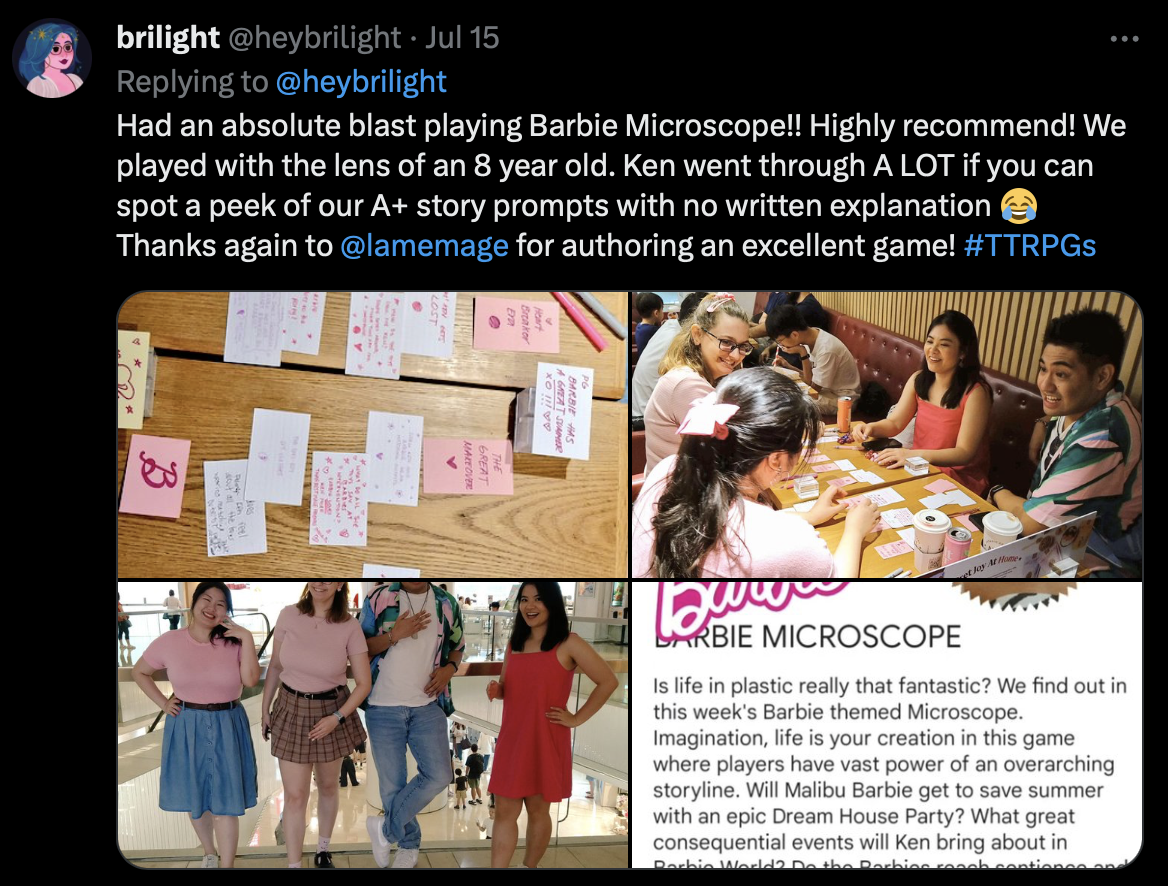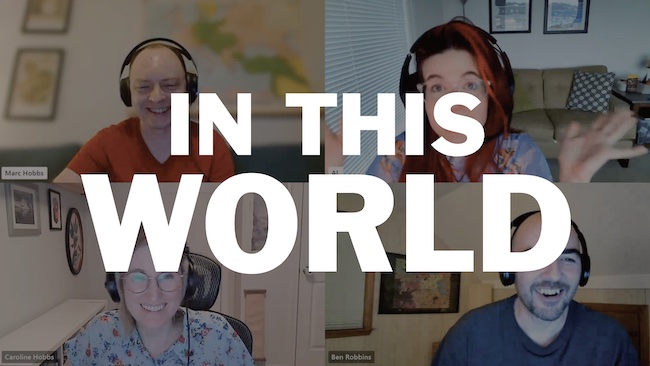
Yes, that’s Barbie Microscope.
There are close ups of the timeline in the thread which are just loaded with golden moments: “Ken is good at taking orders.” “Why does Ken have big feelings???” I can *see* the story arc unfolding.
I have… no words. Just infinite love and respect.
Ben Robbins |
July 16th, 2023 |
kudos, Microscope, what we played
How do you introduce a big mysterious enclave of druids to your D&D players without a boring info dump? Well if you’re a bold experimenter, you have the whole group play a game of Kingdom to create the enclave, so the players already know all about it. Oh and maybe you have to do that with seven players, just to add another wild wrinkle.
How did it go?
In short, it was an incredible experience, met my needs, and is highly recommended. So long as I, as a GM, was
…
[ read more ]
Ben Robbins |
July 12th, 2023 |
crossover, GMcraft, Kingdom, kudos
I’m trying a little experiment.
Role-playing games with no GM are… let’s face it, a tiny weird niche in the tabletop RPG universe. So when you try to talk about GMless games in a forum that is 99.9% about games with a GM, it’s hard to generate any useful discussion density. Lots of people have zero idea what you’re talking about, or are concerned with the kind of things that only matter to GMed games.
We need a place to talk about GMless games specifically. So we made one:
/r/gmless… [ read more ]
Ben Robbins |
July 2nd, 2023 |
how to play, misc, organizing
| 3 comments
From an email I’ve been meaning to post. Today seems like the right day:
Just wanted to let you know – I introduced a friend of mine to Microscope with a 4-person game a few months back, and he enjoyed it so much that I bought him the rulebook. He texted me yesterday saying that he played a 2-person game the other night, just him and his dad (a first-time Microscope player), and that:
“I haven’t had an interaction with my dad like that since we played first edition D&D
…
[ read more ]
Ben Robbins |
June 18th, 2023 |
kudos, Microscope, what we played
| 4 comments
“I’m tired of characters who are just shallow stereotypes…”
We had just finished a delightful session of In This World and were basking in the afterglow. Talk turned to different stripes of gaming, from story games to D&D. Which is when Ace said how tired they were of one-dimensional characters. Characters that were just cardboard cutouts or well-trodden stereotypes instead of digging into what made them who they were. We all agreed that this was indeed a pox upon the house of gaming.
And then Joe said: I wonder if … [ read more ]
Ben Robbins |
June 17th, 2023 |
In This World, what we played
| 1 comment
We had an urge to play some space cowboys. But what does “space cowboys” even mean to us? There was one way to find out: play In This World and chew on our preconceptions.
Our plan was to play In This World to prototype some worlds, and then pick one to use for another game we were going to run. Rather than trying to define “space cowboys” as a concept at the start, we used the ‘combine two things’ technique and inserted space into slot 1 and cowboys into slot … [ read more ]
Ben Robbins |
June 11th, 2023 |
In This World, what we played
| 3 comments
My original plan was to release an early access version of In This World to backers after the Kickstarter ended, so they could get started playing before the whole book was done.
But then the other day I was having a great time playing with a new group of people and it made me think — for the millionth time — that this game is just fun to play. And I thought to myself: why wait? Why not let my backers start playing as soon as possible?
So that’s what … [ read more ]
Ben Robbins |
June 10th, 2023 |
In This World
| 2 comments
Trying something new! I’ve uploaded a gameplay video of one of our In This World sessions. The topic for our worlds: Vacations!

I’ve never tried posting video of our sessions before, but a lot of people have asked to see what all my games look like in action, so we’ll see how this works!
It is, of course, totally unscripted. You get to see the whole process, from sitting down to picking a topic for our worlds to hashing out all the details. Real gaming, warts and all! Big kudos … [ read more ]
Ben Robbins |
May 30th, 2023 |
In This World, video, what we played
or, “Can you play this game solo?”
Ever since I starting working on In This World, it has been slowly taking over my brain. I don’t mean I’m working on it all the time, I mean it is working on me!
I’m just going about my day, minding my own business, and then something crosses my mind, some topic like Toys or Museums or Weather. And immediately I start thinking of statements: common and obvious things that are true about that topic. Things we don’t even normally think about. … [ read more ]
Ben Robbins |
May 24th, 2023 |
In This World
“We started by changing “Story games aren’t about winning,” to “well, actually they are…””
Caroline and Marc took In This World for a spin on a lovely and leisurely Sunday morning. Their topic? Something near and dear to us all: story games!
Less Than Three Games: World of Story Games
“But what I most appreciate about In This World is how it makes me feel that the magic of each and every game is us — people getting together and sharing our unique perspectives to make something new.
“In this… [ read more ]
Ben Robbins |
May 20th, 2023 |
In This World, kudos, what we played
Alien mechs fall from the sky like shooting stars. Their technology is so advanced that even after smashing into the Earth they still work. And just one is advanced enough to change the balance of power. Governments and militaries around the world race to be the first to secure each mech as it falls…
For this session of In This World, instead of a real world topic, we decided to take something fictional for a spin.
Our topic: mechs.
We had Greek warriors laboring to turn gears inside towering … [ read more ]
Ben Robbins |
May 18th, 2023 |
In This World, what we played
The kickstarter for In This World is now live.
I pressed the button and unleashed the flood.
Ben Robbins |
May 16th, 2023 |
In This World









